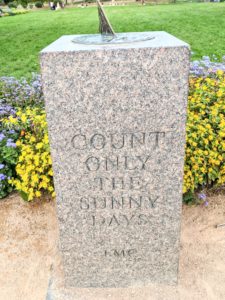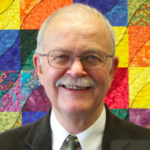
The sundial in the picture is in the Rose Garden by Lake Harriet in Minneapolis, one of my favorite places in the Twin Cities. It took me a minute before I got the irony in the inscription, “Count Only Sunny Days”. If your time piece is a sundial, then you’re not going to be able to count the cloudy days even if you wanted to.
And I’m happy to count the sunny days and believe a positive attitude is a good thing, but I also need to remember the cloudy days, including those that were so cloudy that it was hard to find any light at all. I’m thinking here of the day in 2005 when my wife Susan drove me to the ER of a local hospital because I was so lost in depression that I scared her and scared myself. I was subsequently admitted to a psych unit, the beginning of a long journey of learning to live with major depression and moving towards recovery.
Contrary to the sundial’s message, I want to count this day. Of course, I couldn’t forget it if I wanted to, but I don’t want to. We talk a lot in the UCC about ambiguity and paradox. The kind of paradox I feel with wanting to remember that dark day of my life is reflected in the first two and a half verses in Psalm 40:
I waited patiently for the Lord; he inclined to me and heard my cry.
He drew me up from the desolate pit, out of the miry bog, and set my feet upon a rock, making my steps secure.
He put a new song in my mouth, a song of praise to our God.
I do not know what prompted the psalmist to write this psalm. I do know that when I read about “the desolate pit” and the “miry bog”, I think about depression and imagine the psalmist, who wrote these words thousands of years ago, to be a person living with depression like me. I also know that finding these words in the Bible helped me break through the isolation that came with my mental illness.
In recovery I love to sing a new song, and most days I do. But in paradox, I also want to remember the pit and the bog. They are part of my life; they count for me. I don’t want to count only sunny days.
Why is that? Another paradox - a wise woman I met on the psych unit told me, “Bob, my meltdown was the worst thing and the best thing that ever happened to me.” I quickly agreed with the first part. The unbearable pain of severe depression, all that it cost me – including having to resign as pastor at a church I mostly loved – what it cost my family, without a doubt it was the worst thing that ever happened to me.
But the best thing? Seventeen years later, I’m still thinking about that one. But more and more, I think I get it. As bad as it was, I’m still here, a survivor with a story to tell. As that wise woman helped me in the hospital by telling me her story, I can now help others by telling them mine. Yes, it’s a story that includes some dark days, honest about the pain and loss caused by mental illness. But it’s also a recovery story, one that ends with me singing a new song. I believe that it’s a story of hope, grounded in my own lived reality.
To count only the sunny days is to forget my story. I’m not going to do that. I’ve paid a very high price for it, and I know that I can use my story to help other people. Why would I not want to count it? After all, telling my story doesn’t stop me from singing my new song. Actually, it makes me sing louder.

Bob Griggs
Ordained in 1973, Bob Griggs has served UCC churches in Massachusetts, New Hampshire, and Minnesota. He is an Advisory Council member at Vail Place, a club house for people living with mental illness. He is also the author of A Pelican of the Wilderness: Depression, Psalms, Ministry, and Movies and Recovering from Depression: Forty-Nine Helps.